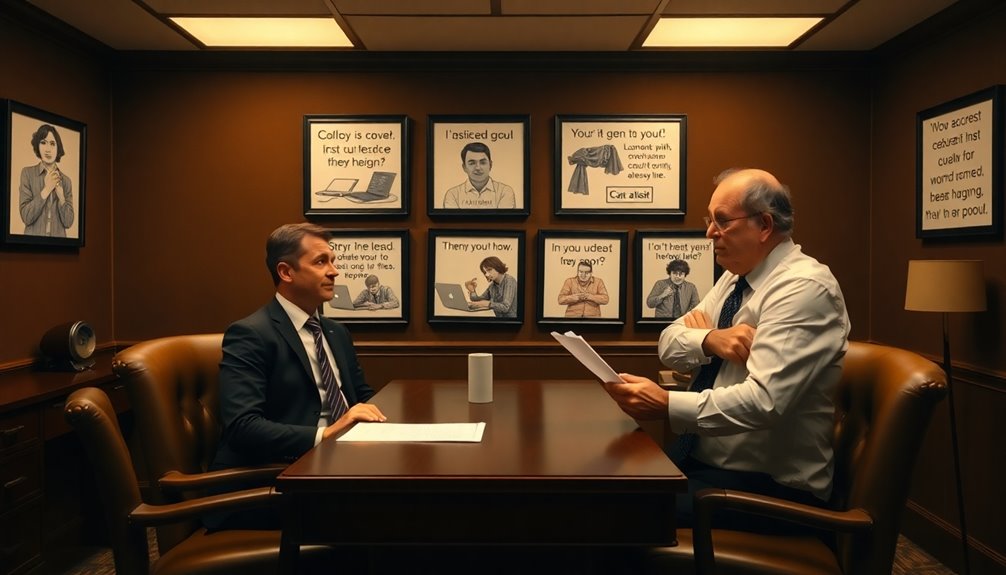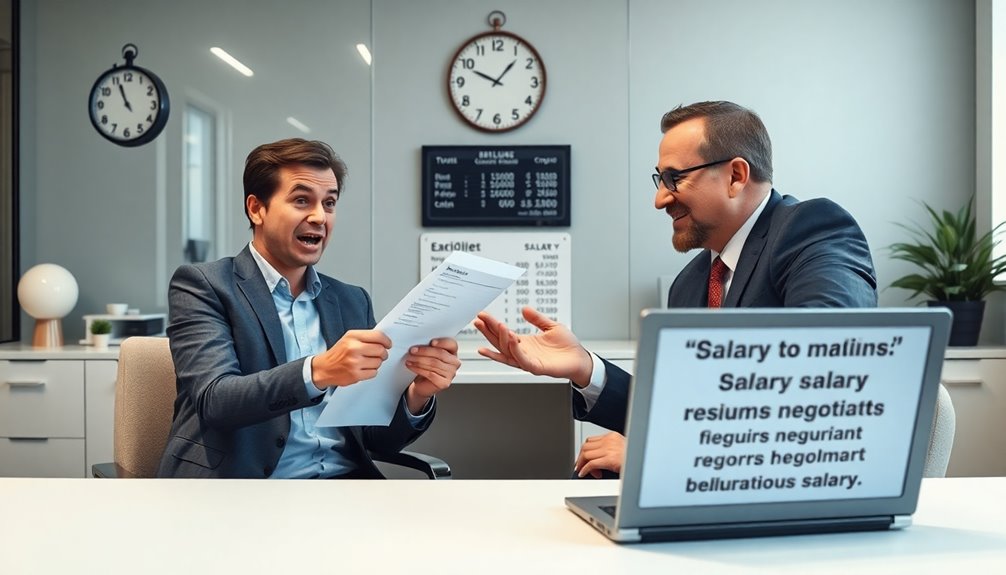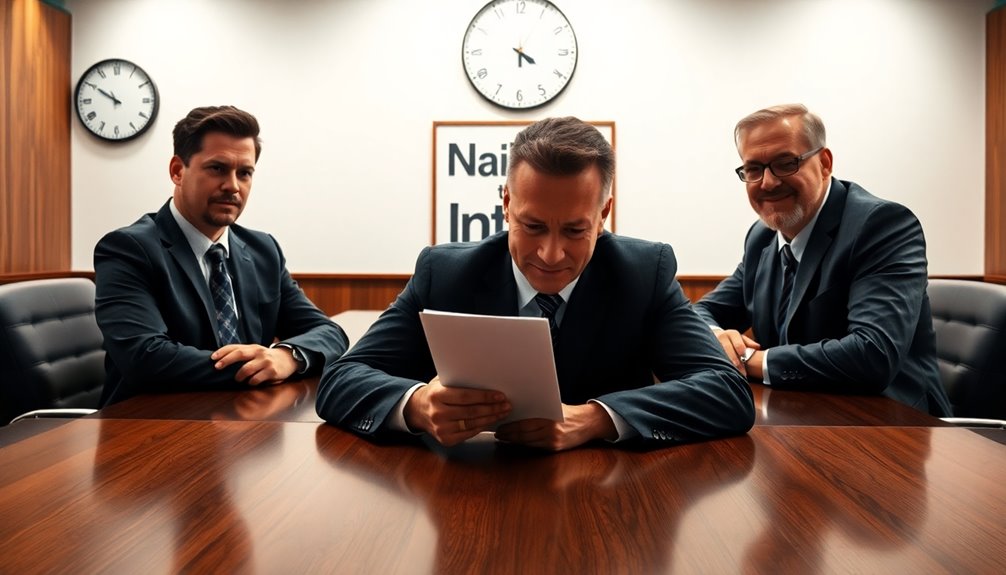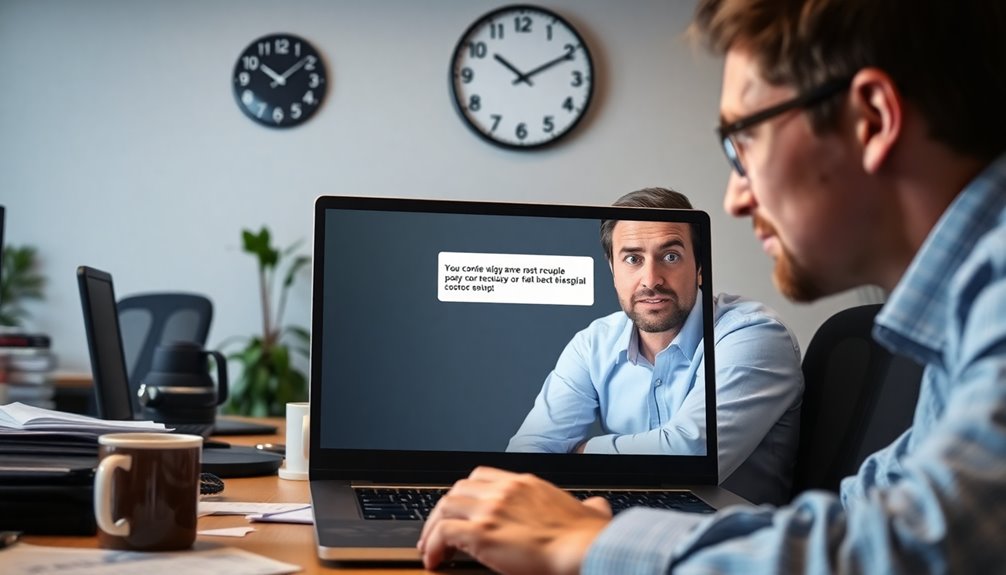Job interviews can be a wild ride, and you're not alone in feeling the pressure. From awkward silences to unexpected questions, these moments spark plenty of nervous laughs. You might relate to the struggle of forgetting your resume or the anxiety of trying to impress every panel member. The tech glitches and fashion dilemmas can add to the chaos, but let's face it: every candidate knows the struggle. Celebrate those relatable moments with these 15 hilarious memes that perfectly capture the interview experience. Stick around, and you'll find even more candid insights that will resonate with your own journey!
Key Takeaways
- Nervous laughter often emerges during interviews, reflecting a common anxiety that many candidates experience in high-pressure situations.
- Candidates frequently encounter unexpected questions, leading to relatable moments of confusion and humor during the interview process.
- Tech glitches and blunders are common, providing candidates with amusing stories about their interview mishaps.
- The struggle to remember key achievements or the awkwardness of forgetting a resume can lead to lighthearted, relatable moments.
- Unusual interview scenarios often create amusing anecdotes that candidates share, showcasing the lighter side of the job search experience.
The Awkward Silence Moment

In nearly every job interview, you might encounter that dreaded "Awkward Silence Moment." It often happens when you're caught off guard by a question, leading to a few uncomfortable seconds of silence that can feel like an eternity. During these moments, it's essential to maintain your confidence. Research shows that body language plays a significant role—if you avoid eye contact or fidget nervously, you risk appearing less suitable for the role.
Feeling pressured to fill the awkward silence can drive you to ramble or provide irrelevant answers, which might hurt your chances. Remember, recruiters often decide within the first 90 seconds, making those initial moments vital. Instead of succumbing to the pressure, try to embrace the silence. Take a deep breath and gather your thoughts. This can help you convey more thoughtful responses.
A little humor can also diffuse the tension. Sharing a light-hearted comment can create a more relaxed atmosphere, making it easier for both you and the interviewer. Ultimately, embracing the awkward silence as a natural part of the conversation can enhance your confidence and improve your overall interview experience.
Unexpected Interview Questions

Unexpected interview questions can throw you for a loop, challenging your creativity and problem-solving skills in real-time. When an interviewer asks something like, "If you were a superhero, what would your superpower be?" it can catch you off guard. Research shows that up to 30% of interviewers pose unusual questions to gauge how well candidates think on their feet.
These unexpected interview questions can ramp up your anxiety, making you feel nervous and self-doubting. But don't let that overwhelm you! Preparing for such scenarios can enhance your confidence. Practice flexible thinking and brainstorm unique answers that reflect your personality.
Using humor can also be a great strategy. It not only helps ease the tension but allows you to showcase your adaptability, making you stand out as the best candidate. Remember, the goal is to demonstrate your ability to think creatively and respond positively to surprises. So, the next time you face an unexpected question, take a deep breath, think outside the box, and let your personality shine!
Overthinking Every Answer

Overthinking your answers during an interview can sabotage your performance and leave you feeling less confident. You might find yourself second-guessing your responses, which detracts from your authenticity. Research shows that 70% of candidates feel nervous when articulating their answers, leading to a tendency to overanalyze. You could spend hours preparing for potential questions, but this preparation can result in paralysis by analysis, making it hard to deliver clear and concise responses.
The pressure to provide the "perfect" answer can shift your focus to what you think the interviewer wants to hear, rather than expressing your genuine thoughts and experiences. This approach can alienate you from your true self, leaving you sounding rehearsed and disconnected. Remember, first impressions are formed within the first 90 seconds of the interview, and overthinking can severely hinder your ability to make a strong impact.
The Dress Code Dilemma

Your interview prep doesn't just include polishing your answers; it also involves choosing the right outfit. About 70% of recruiters view trendy attire negatively, so you need to think carefully about what you wear. Consider the company's culture and values—does it lean more formal or casual? Aligning your outfit with their expectations can set the right tone from the start.
Traditional interview attire, like business formal, is usually your safest bet. While you might be tempted to showcase your personal style, remember that extremes in fashion can distract from your qualifications. A balanced and professional appearance can greatly influence how recruiters perceive you.
To avoid the dress code dilemma, do a little research on the company. Check their website or social media to get a sense of their vibe. When in doubt, it's better to err on the side of being slightly overdressed than underdressed. You want to leave a positive first impression, and your outfit plays an essential role in that. By understanding the nuances of dress codes, you can make informed choices that enhance your confidence and professionalism during the interview.
When You Forget Your Resume

You walk into the interview and suddenly realize you've left your resume at home—panic sets in. In that moment, you need quick thinking to redirect the conversation and showcase your skills without your trusty document. It's a relatable crisis that many candidates face, often leading to a mix of anxiety and humor.
Panic Sets In
Walking into an interview without your resume feels like stepping into a lion's den unarmed. The moment you realize you've forgotten it, panic sets in. You might feel your heart racing and your palms sweating, as the realization hits: you've left a essential piece of your job application behind. Recruiters typically spend just 5-7 seconds glancing at resumes, making that first impression critical. Without your resume, you sense vulnerability creeping in, and your confidence plummets.
To lighten the mood, many candidates turn to humor, sharing memes that capture the absurdity of the situation. Here's a quick look at some common reactions:
| Reaction | Description | Coping Mechanism |
|---|---|---|
| Sweaty Hands | You can't remember if you've ever sweat this much. | Wipe them on your pants |
| Racing Heart | Feels like you're about to run a marathon. | Deep breaths |
| Blank Mind | You suddenly forget everything about your skills. | Pretend it's a casual chat |
| Awkward Silence | The interviewer looks at you expectantly. | Make a joke |
| Overthinking | You replay every moment in your head. | Visualize success |
Embrace the chaos; you're not alone!
Quick Thinking Required
Forgetting your resume during an interview can trigger a whirlwind of stress and anxiety, leaving candidates feeling unprepared and vulnerable. You might feel panic rising as you realize you're expected to discuss your experiences without the safety net of your printed resume. Many interviewers anticipate that candidates will have a strong grasp of their qualifications, which can be tough when you typically rely on a paper reference.
In this moment, quick thinking becomes vital. You'll need to summarize your key achievements and experiences from memory, piecing together your professional story as best you can. Keeping calm and exuding confidence is essential; your poise in the face of adversity can impress interviewers more than you think.
To avoid this scenario in the future, consider having a digital copy of your resume on your phone or in your email. This backup allows you to retrieve your information quickly if you forget the printed version. Ultimately, it's all about adapting and showcasing your skills, even when the unexpected happens. Embrace the challenge, and remember—it's about how you handle the situation that counts!
Nervous Laughter During Interviews

You might find yourself laughing nervously during an interview when faced with awkward silences or unexpected questions. This laughter often serves as a coping mechanism for anxiety, helping to lighten the mood, even if it can confuse interviewers. Recognizing what triggers this response can lead to a more supportive atmosphere for everyone involved.
Common Triggers for Laughter
Job interviews can be nerve-wracking, and nervous laughter often sneaks in as a coping mechanism. You might find yourself chuckling unexpectedly when the pressure mounts, especially since around 70% of candidates experience anxiety during interviews. This heightened stress can trigger those unwelcome giggles, making it feel like a rollercoaster of emotions.
Sometimes, you might even lean on humor to lighten the mood and create a more relaxed atmosphere, but if it manifests as nervous laughter, it can backfire. Interviewers may misinterpret your laughter as a sign of unprofessionalism or lack of confidence, adding to your unease. The key is to recognize these common triggers—like unexpected questions or a sudden silence in the room—and be prepared.
Practicing your responses and getting to know the company beforehand can greatly reduce anxiety. Familiarity with the interview process can help minimize those nervous chuckles, allowing you to present yourself more confidently. Additionally, maintaining a positive mindset, similar to the techniques for enhancing performance in sports through visualization techniques, can further bolster your confidence during the interview. Remember, while nervous laughter is common, being aware of its triggers can help you manage it better. You've got this!
Coping Mechanisms for Anxiety
Nervous laughter can be a double-edged sword during interviews, serving both as a coping mechanism and a potential pitfall. It's common for candidates to feel anxious, with around 70% experiencing pre-interview jitters. Using humor can ease tension, making you and the interviewer feel more at ease. When you acknowledge your nervousness with a light-hearted comment, you come across as relatable, which can enhance rapport.
However, it's essential to balance humor and professionalism. Practice using humor in mock interviews to get comfortable and authentic with your responses. Here's a quick look at the pros and cons of nervous laughter:
| Pros | Cons |
|---|---|
| Diffuses tension | Can seem unprofessional |
| Makes you relatable | Might distract from key points |
| Enhances rapport with interviewers | Risks overshadowing your qualifications |
It's also worth noting that maintaining emotional alignment can help you navigate anxiety and present your best self during interviews.
The Classic "Tell Me About Yourself"

One of the most common questions in interviews is, "Tell me about yourself," and it can set the stage for the entire conversation. This question gives you a chance to showcase your background and how you fit for the role. To make the most of it, structure your response using the "Present-Past-Future" model. Start by discussing your current position, then highlight relevant previous experiences, and finally, share your future aspirations.
Remember, interviewers often form first impressions in just 5-7 seconds, so your response must be strong and confident to grab their attention. Tailoring your answer to the job description is key; focus on experiences and skills that align with the company's needs and culture. This approach not only makes your answer more impactful but also shows that you've done your homework.
Practicing your introduction can help reduce anxiety, especially since many candidates feel nervous when asked to summarize their career in a few sentences. So, take the time to prepare and rehearse your response, and you'll find that this classic question can become a powerful opportunity to shine in your interview.
Preparing for the Worst Case

When you prepare for a job interview, it's smart to anticipate tough questions that might pop up. Think about how you'll manage anxiety and stress while addressing potential challenges like employment gaps or failures. By practicing your responses and staying positive, you'll feel more confident and capable of handling whatever comes your way. Additionally, understanding emotional dysregulation can help you better prepare for any unexpected challenges during the interview process.
Anticipating Common Interview Questions
Preparing for a job interview can feel intimidating, but anticipating common interview questions can give you a significant advantage. By preparing thoughtful responses, you can show your fit for the role and demonstrate self-awareness. Here are four key questions to anticipate:
1. "Why do you want to work for this company?"
Research the company's mission and values, and tailor your answer to reflect how you align with them.
2. "Describe your strengths and weaknesses."
This question gauges your self-awareness. Be honest about your weaknesses while highlighting your strengths with specific examples.
3. "How do you handle conflict in the workplace?"
Familiarize yourself with behavioral questions like this one. Use the STAR method (Situation, Task, Action, Result) to provide clear, structured answers.
4. "Where do you see yourself in five years?"
Prepare to articulate your long-term goals while showing how they align with the company's future direction.
Managing Anxiety and Stress
Job interviews can trigger intense anxiety for many candidates, leading to physical symptoms like sweaty palms and an accelerated heartbeat. To manage this stress, preparation is essential. Familiarizing yourself with the company and the role can boost your confidence considerably. Research shows that candidates who do their homework feel more at ease during interviews.
Practicing common interview questions is also important. Techniques like the STAR method—where you outline the Situation, Task, Action, and Result—can help you articulate your experiences clearly, minimizing anxiety. Remember, you're not alone in this; many candidates share those nerve-racking feelings, which can create a sense of camaraderie.
Don't underestimate the power of humor. Sharing job interview memes can provide comic relief and lighten the mood, making the process feel a bit less intimidating. When you keep anxiety in check with preparation and a good laugh, you'll find it easier to present your best self. Additionally, employing techniques like mindfulness practices can further help in reducing anxiety and enhancing focus. So, take a deep breath, prepare for the worst-case scenario, and embrace the experience. You've got this!
Ghosting After the Interview

After an interview, the silence can be deafening, leaving candidates in a frustrating limbo. You've put in the effort, and now you're left wondering if you'll hear back. Ghosting after the interview isn't just a bad look; it can seriously damage an employer's reputation. About 80% of candidates feel frustrated when they don't receive communication about their status.
To avoid the pitfalls of ghosting, employers should consider these steps:
- Regular Updates: Even if the news isn't good, keeping candidates informed fosters trust.
- Systematic Feedback: Implementing a structured approach to provide updates can ease the emotional toll of waiting.
- Respect Candidates' Time: A simple acknowledgment of their effort shows respect for their time and interest.
- Preserve Your Talent Pool: Negative experiences can deter top talent from applying in the future, so it's in an employer's best interest to stay in touch.
Misunderstanding Job Descriptions

Steering through job descriptions can feel like deciphering a foreign language. You scan the text, but all you see is a jumble of jargon and overly technical terms that leave you scratching your head. It's no wonder many candidates misread the actual requirements and apply for roles that don't fit their skills or experience. This confusion not only wastes your time but also the employer's.
Research shows that about 50% of job seekers feel overwhelmed by complex postings, which can deter them from applying at all. When job descriptions lack clear communication about essential responsibilities and qualifications, the misunderstanding only deepens.
To avoid this pitfall, don't hesitate to seek clarification during interviews. By discussing specific responsibilities, you can align expectations and guarantee you're both on the same page. Remember, it's better to ask questions than to assume you know what the role entails. So, next time you're faced with a baffling job description, take a deep breath, break it down, and reach out for clarity. You might just find that perfect fit you've been searching for!
The Salary Discussion Struggle

Maneuvering salary discussions can feel like walking a tightrope. You want to advocate for yourself, but you also worry about undervaluing your worth or pricing yourself out of the job. It's no surprise that a survey found 60% of job seekers find salary talks the most stressful part of the interview process. Here are some key strategies to help you navigate this tricky terrain:
- Research Industry Standards: Familiarize yourself with the market value for your role. This knowledge boosts your confidence when discussing numbers.
- Be Transparent: If you have salary expectations, communicate them clearly. Transparency fosters trust and opens the door to honest dialogue.
- Seek Clarity Early: Employers should share salary ranges upfront, so you know what to expect. It alleviates concerns and sets a collaborative tone.
- Prepare for Negotiations: Anticipate the conversation and prepare your rationale, so you can discuss your worth confidently.
Trying to Impress the Panel

In the crucial moments of an interview, you're not just presenting your qualifications; you're also showcasing your personality to a panel that's making snap judgments. With research showing that 33% of recruiters decide within the first 90 seconds, the pressure's on. You might feel anxious trying to balance your expertise with your unique charm, and that can lead to performance hiccups.
To impress the panel, you'll likely prepare tailored responses that highlight your skills while aligning with the company's values. Knowing the ins and outs of the organization can set you apart. Don't underestimate the power of body language—maintaining confident posture and making eye contact can drastically shape their perception of you.
Sometimes, a light-hearted joke or anecdote can work wonders. It helps you connect with interviewers, making you more memorable in a sea of candidates. Just make sure your humor fits the professional context. Remember, being genuine is key; the panel wants to see the real you. Embrace the challenge, and show them why you're the perfect fit!
The Follow-Up Email Blues

Maneuvering the follow-up email after an interview can feel like walking a tightrope. You want to express gratitude but also maintain that professional edge. The pressure of waiting 10-14 days for a response can lead to anxiety, making your follow-up even more essential. Remember, 80% of candidates believe that a thank-you email boosts their chances, and 70% of recruiters appreciate candidates who reach out post-interview.
Here's how to craft the perfect follow-up email:
- Send it within 24-48 hours: Timing is everything. A prompt email shows professionalism.
- Keep it concise: Respect their time. A few short paragraphs are enough.
- Express gratitude: A simple "thank you" can leave a lasting impression.
- Inquire about next steps: This indicates your continued interest and keeps the conversation going.
When Technology Fails You

Technical failures during a job interview can turn a promising opportunity into a frustrating experience. Imagine you're confidently answering questions when suddenly, your video freezes, leading to an awkward pause that feels like an eternity. You're not alone; 97% of candidates report that such glitches can shake your confidence and hinder your performance.
If you're not familiar with video conferencing tools, you might accidentally forget to mute yourself while talking or, worse, unmute at the wrong moment. This happens to 62% of candidates, and it can lead to unintentional blunders that distract from your qualifications. Connection issues can also disrupt the conversation, causing you to miss vital questions or misinterpret the interviewer's responses, which 74% of interviewers notice.
Feeling embarrassed is common when technology fails, with 86% of candidates worrying about how these mishaps affect the interviewer's view of their professionalism. To combat this stress, preparing for potential tech failures is key. Having backup devices or alternative communication methods can help 68% of candidates stay focused on showcasing their skills, rather than stressing over tech troubles.
Celebrating the Small Wins

Job interviews can feel overwhelming, but celebrating small wins along the way makes the journey more manageable. Acknowledging your achievements can boost morale and keep you motivated during the job search. Recognizing these incremental successes not only maintains your positive mindset but also enhances your self-efficacy, potentially leading to better performance in future interviews.
Here are some small wins worth celebrating:
- Securing an Interview: Landing an interview is a significant step toward your dream job.
- Answering a Tough Question: Successfully maneuvering a difficult question shows your preparedness and adaptability.
- Mastering the STAR Method: Being able to effectively use this technique demonstrates your ability to articulate experiences clearly.
- Receiving Positive Feedback: Whether from a friend or a mock interview, positive reinforcement can boost your confidence.
Sharing these small victories with others, even through memes, can create a sense of community. Humor can lighten the load and remind you that you're not alone in facing the challenges of job hunting. So, take a moment to celebrate those small wins—they're the building blocks of your success!
Frequently Asked Questions
How Can I Prepare for Unexpected Interview Questions?
To prepare for unexpected interview questions, you should practice thinking on your feet. Start by reviewing common questions and crafting thoughtful responses. Next, engage in mock interviews with a friend or mentor, focusing on spontaneity. It's also helpful to familiarize yourself with the company and industry trends, as this knowledge can guide your answers. Finally, stay calm and confident; it's okay to take a moment to gather your thoughts before responding.
What Should I Do if I Forget My Resume?
If you forget your resume, don't panic! First, explain the situation calmly to the interviewer. They'll appreciate your honesty. Then, try to provide a brief overview of your experience and skills from memory. If possible, offer to send a digital copy later. Make sure to highlight relevant achievements during the conversation. Remember, interviews are about showcasing your personality and fit, so focus on that instead of stressing over a missing document!
How Do I Handle Nervous Laughter During Interviews?
If you find yourself laughing nervously during an interview, take a deep breath and pause for a moment. Acknowledge the laughter by saying something like, "I'm a bit nervous, but I'm excited to be here." This shows your self-awareness and can help ease the tension. Redirect your focus to the interviewer's questions, and remember that it's okay to be a little human. Just stay calm and keep the conversation flowing naturally.
What Should I Wear to an Interview?
Did you know that 93% of employers say that appearance notably impacts their initial impression? When deciding what to wear to your interview, aim for professional attire that reflects the company's culture. For most situations, a tailored suit or dress paired with polished shoes works well. Avoid overly bright colors or flashy accessories. Focus on looking neat and confident, as a good outfit can boost your self-assurance during the interview process.
How Can I Follow up Effectively After an Interview?
After your interview, send a brief thank-you email within 24 hours. Express your appreciation for the opportunity and reiterate your interest in the position. Keep it concise and professional. If you haven't heard back within a week or two, it's perfectly fine to follow up with a polite inquiry about your application status. This shows your enthusiasm and keeps you on their radar without being too pushy.
Conclusion
In the whirlwind of job interviews, you've likely faced these funny fiascos. From awkward silences to tech troubles, every candidate's journey is filled with relatable moments that bring a chuckle. Embrace these experiences, as they make you more human and highlight your resilience. So, when the next interview comes knocking, remember to breathe, laugh, and let your personality shine. After all, you're not just chasing a job; you're starting on a journey of joyful growth!









